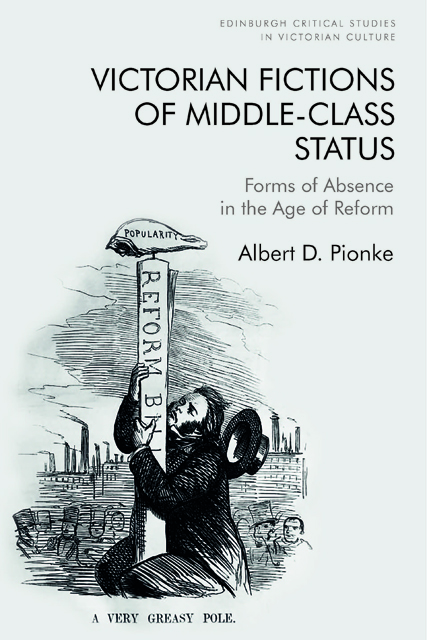Book contents
- Frontmatter
- Contents
- Acknowledgements
- Introduction: Victorian Middle-Class Status and the Negative Assertion of Value
- 1 The Orphan Narratives of a Class Lacking Antecedents
- 2 Repudiations of Wealth in Victorian Financial Fiction
- 3 The Violence at the Heart of the Social Problem Novel
- 4 Social Domination, Social Scientific Empiricism, and Novelistic Distrust of the Modern Fact
- 5 Legitimizing the Subjection of Middle-Class Women in Mid-Victorian Fiction
- Afterword
- Bibliography
- Index
Afterword
Published online by Cambridge University Press: 25 April 2023
- Frontmatter
- Contents
- Acknowledgements
- Introduction: Victorian Middle-Class Status and the Negative Assertion of Value
- 1 The Orphan Narratives of a Class Lacking Antecedents
- 2 Repudiations of Wealth in Victorian Financial Fiction
- 3 The Violence at the Heart of the Social Problem Novel
- 4 Social Domination, Social Scientific Empiricism, and Novelistic Distrust of the Modern Fact
- 5 Legitimizing the Subjection of Middle-Class Women in Mid-Victorian Fiction
- Afterword
- Bibliography
- Index
Summary
As the wife of the eldest surviving member of the Keith clan, with the young heir literally “scrambling to his place” in her lap “as one who felt it his own nest and throne,” Ermine holds the lineal and financial future of this traditionally military family in her hands (543). That she can be trusted with her charge seems amply demonstrated by her conduct throughout the prior years of her family’s disgrace, her fortune’s dissipation, her body’s disability, and her immediate society’s confinement to the “circumscribed view” afforded by her sitting room and small garden (79). Within the domestic limits of Mackarel Lane, Ermine practices with near ascetic discipline the negative assertions of value discussed in the individual chapters of this book; crucially, though, her individual deserts, by themselves, are not enough to change her or her sister’s circumstances. Ermine needs disinterested recognition before she can assume the social place she has already earned by her exquisitely appropriate behavior. With this necessity in mind, one might read The Clever Woman of the Family as narrating the characterological developments required for Rachel to be able to perceive, articulate, and thereby secure Ermine’s middle-class status. Not only, then, does Yonge’s novel reveal the precarious reliance of mid-century men such as Alick and Colin Keith on women’s renunciation of masculine authority, it also makes perspicuous the epistemologically fraught nature of a broader middle-class status that could only be warranted by the timely approbation of strategic absences.
In making the representation of McKeon’s “sociohistorical condition of status inconsistency” also a problematic inherent to the novelistic re-presentation of a hierarchically unstable society, Yonge demonstrates a fundamental aesthetic congruity with her fellow Reform-era novelists that transcends their at times substantial ideological differences. Thus, one might describe the essential narrative trajectory of No Name as positioning Magdalen to be able to affirm the long apparent virtues of Norah even as she shreds the newly rediscovered Trust. In Felix Holt, the discursive, physical, and legal trials of Felix similarly teach him to perceive the social worth of Esther Lyon. North’s The City of the Jugglers arguably seeks to make such individual acts of recognition valid more generally, to show society as a whole how to appreciate the value of genius in the abstract.
- Type
- Chapter
- Information
- Victorian Fictions of Middle-Class StatusForms of Absence in the Age of Reform, pp. 209 - 213Publisher: Edinburgh University PressPrint publication year: 2022

